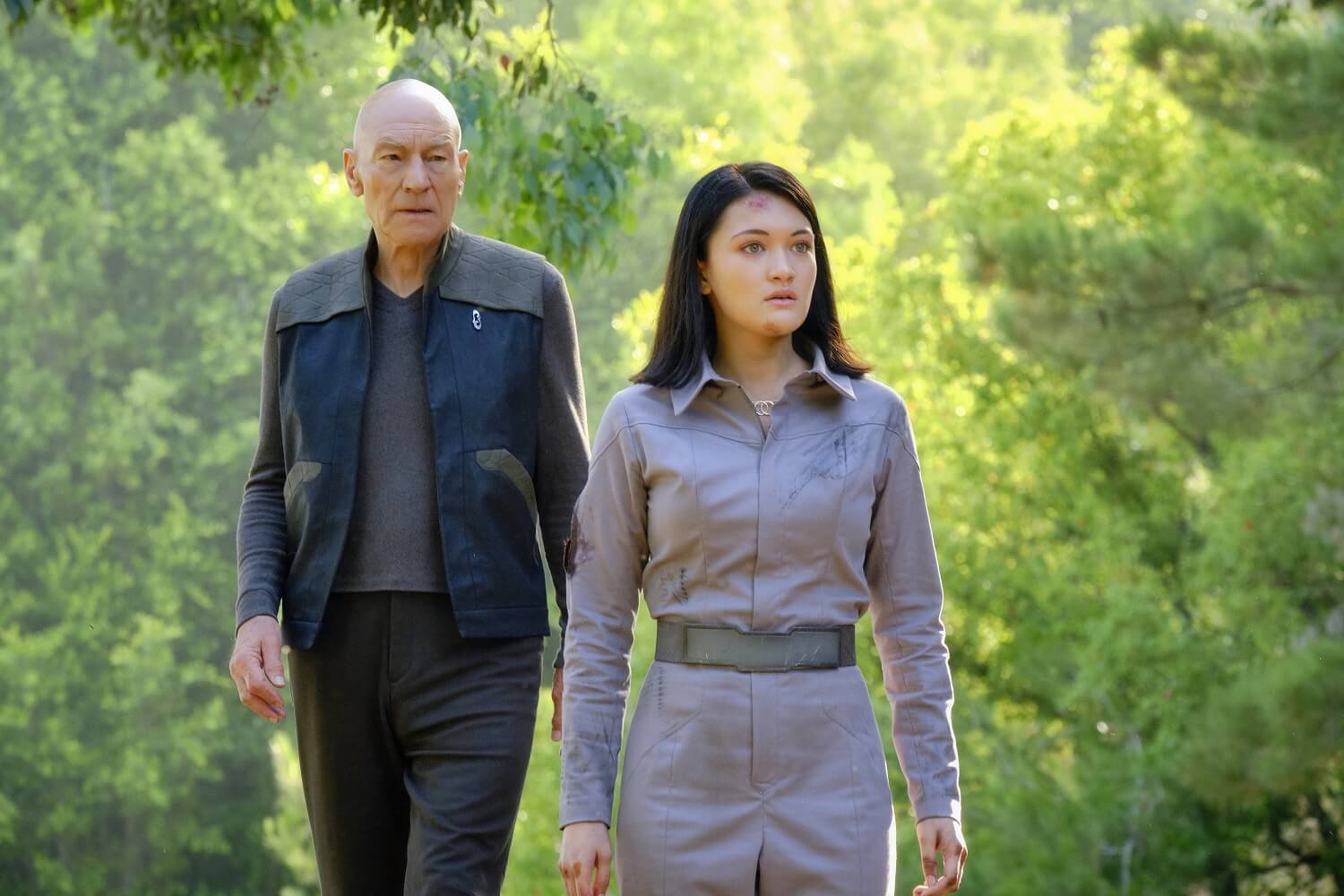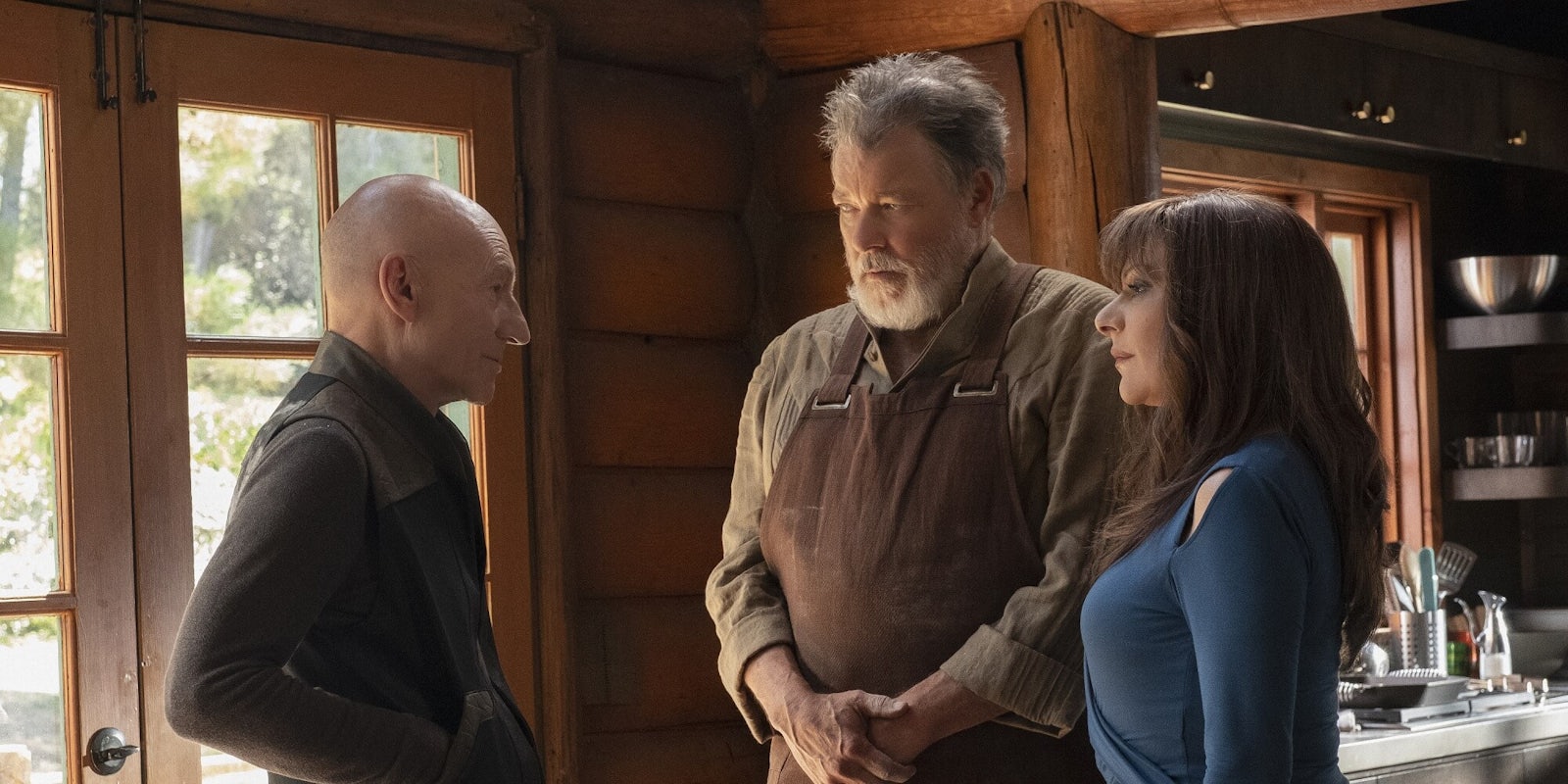This post includes spoilers. Click here for our episode 6 recap.
Following last week’s traumatic escape from the Borg Cube, episode 7 delivers an A-plot where the main characters eat pizza and talk about their feelings… and a B-plot where some other characters eat cake and talk about their feelings. Ideal! (The C-plot involved horrible things happening to my beloved Hugh and Elnor, but you can’t have it all.)
“Nepenthe” turns out to be a peaceful planet where Will Riker and Deanna Troi are spending their retirement years, a perfect place for Picard and Soji to hide out. It’s both a long-awaited reunion for two beloved Next Generation characters, and a chance to take a breather before the season enters its final act. Living in a huge house in the middle of sun-dappled woodland, Riker and Troi have a more predictably happy retirement for Star Trek heroes, contrasting with the unexpectedly grim fates of Hugh, Seven of Nine, and Picard. They also have a child, Kestra: precisely the type of precocious tween you’d expect to emerge from TNG’s earnest family environment. Kestra speaks multiple alien languages and when Picard and Soji arrive, she’s LARPing with a bow and arrow in the forest. She is, I concede, less annoying than Wesley Crusher.
Star Trek: Picard | Our Spoiler-Free Review:
Watch Picard for free with a 1-week trial of CBS All Access.
Soji is very much the worse for wear. She’s all alone in the galaxy, and there wasn’t any time to explain the situation while they fled the Borg Cube. She only acknowledges that she’s an android when Kestra innocently asks her about it, and that realization is even more upsetting for her than it was for Dahj. After Narek’s betrayal, she has no idea who she can trust, including herself. Rightfully paranoid, she points out that this whole trip could be a ruse, lulling her into a false sense of security in this charming house where Riker cooks pizza with home-grown tomatoes, and Kestra shares heartwarming stories about Data, the closest thing Soji has to a biological father. Now she knows she was only created three years ago, what does her identity actually mean? Tellingly, she introduces herself as “just Soji,” dropping the doctorate that she didn’t earn, and the surname for a family that never existed.

Picard doesn’t fully understand the depths of her trauma until Troi explains where Soji’s coming from. Yes, that’s right. Unlike most of TNG’s seven-season run, this episode actually makes use of Troi’s professional expertise as a counsellor. She talks to Soji while Riker tackles Picard – a friendly interrogation where Riker deduces the whole mess with Soji and the Romulans because he simply knowns Picard that well. Beneath that jovial exterior beats the heart of a seasoned Starfleet officer, and this isn’t his first rodeo. It’s a wonderfully warm performance from Jonathan Frakes, who is now a full-time director with only a handful of live-action acting credits after his final Star Trek film in 2002.
Riker and Troi’s domesticity also creates an interesting contrast to Picard’s unwilling retirement. In my first recap, I noted that Picard (perhaps unwittingly) structured his home life like a starship, acting like the captain of his vineyard with Laris and Zhaban as his command crew. He’s a loyal friend and mentor, and in later life he’s even grown to love children, but Picard just isn’t a family man. His family is his crew, and even at the age of 92, he’d rather risk his life for a good cause than stay comfortably at home. Meanwhile, Riker and Troi actually are happy to settle down, adding an almost parental undertone to their friendship with Picard, who in some ways now behaves like a youthful free-spirit. Not a role we could’ve predicted from his backstory as a mature, sensible Starfleet insider. Soji still has a long way to go before she’s comfortable in her own skin, but as Kestra points out, she and Picard could be a different kind of family to each other. They may not know each other very well right now, but this relationship will presumably provide the backbone of the next two seasons.
The one stormcloud in Riker and Troi’s sunny retirement is the death of their son Thad. He died from a neurological disease, which turns out to have direct relevance to the synthetic ban – and by extension, Soji. Apparently he could’ve been cured by culturing cells in an “active positronic matrix” (aka an android brain), but by the time Thad was diagnosed, no one was allowed to make them anymore. It’s a neat little illustration of how paranoid bigotry has far-reaching and unexpected consequences – and we can’t help but wonder if Picard’s own illness could be cured through similar means.
While Picard and Soji are de-stressing on Nepenthe, La Sirena is being chased across the galaxy by Narek, who (of course!) has his own black Darth Vader stealth ship. Rios can’t figure out how the hell Narek keeps tracking them, but the episode’s first scene explains everything. Three weeks ago, when Commodore Oh approached Agnes Jurati, it wasn’t just a creepy check-up from Starfleet Intelligence. Oh was recruiting her to track Soji for the Zhat Vash, persuading her via Vulcan mind-meld that the future of the galaxy was at stake. She shows Jurati a vision where synthetic life spawns apocalyptic doom; a vision so convincing that Jurati a) immediately vomits, and b) later finds it necessary to murder Bruce Maddox. However, chasing Picard and Soji to their deaths is a step too far. While Jurati clearly believes that Oh’s vision is true, and the only way forward is to eradicate all synthetic life, she still isn’t a trained Zhat Vash agent like Narek or Narissa. She’s a rather timid academic who is in way over her head. She knows the Zhat Vash can find La Sirena because Oh made her swallow a digestible tracking device, turning her entire body into a homing beacon. The only solution is to shut that body down.
Jurati isn’t exactly great at hiding her emotions, so Raffi and Rios can tell something’s wrong. Raffi takes her down to the mess hall to eat cake and talk it out, an amusingly condescending scene where you can’t help but remember that Raffi is a former intelligence officer with interrogation training. She couldn’t have predicted the eventual outcome, though. While Raffi thinks Jurati is crying over Bruce Maddox’s death, she’s actually crying over Maddox’s murder. As soon as she’s left alone, Jurati injects herself with a hypospray full of poison, deactivating the Zhat Vash tracker and sending herself into a coma.
Back on the Borg Cube, things are getting literally and thematically dark. The partnership between Elnor and Hugh—a match made in heaven because Elnor needs a “hopeless cause” to follow, and Hugh desperately needs a loyal friend and bodyguard—only lasts a single episode, because Narissa straight-up murders Hugh. But not before killing a bunch of ex-Borgs in front of him, to make this whole scenario as upsetting as possible. Elnor ends the episode by calling the Fenris Rangers (ie. Seven of Nine) for help, but I’m left wondering if the show’s body count is now just too damn high. Am I biased because Hugh was one of my favorite characters and I didn’t want him to die? Well, duh. Obviously. But it also seems needlessly grim. Picard reintroduced Hugh as a selfless hero who saved a community of refugees facing impossible odds, and his story ends with him dying as collateral to the main storyline with Soji and Picard. I would’ve preferred to see him (and even Elnor) get a more hopeful exit, even if we didn’t see Hugh onscreen again.


